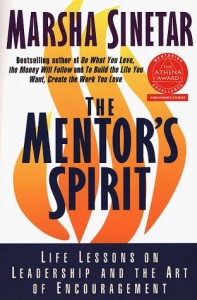“Mentoring is not a new concept in business circles, but, as usual, Sinetar (Do What You Love, the Money Will Follow) brings a broader, more original perspective to a familiar theme.”
– Publisher’s Weekly, 1998
“[Sinetar] strikes it rich again… Her prose varies between translucency and… philosopher Heideggar’s style, where just one or two readings do not capture all the inherent meanings.”
– Booklist, May 1998
“From the author of Do What You Love, the Money Will Follow, a new work that is equally heartfelt, that speaks to the soul.”
– Business Ethics, October 1998
“With The Mentor’s Spirit, Sinetar redefines leadership for the 21st Century…repaints the entire landscapes of relationships… has a uniquely exquisite ability to see into elements of life as no one else and then explain them with new shading of how they can be if we all just give our best. With The Mentor’s Spirit, [Sinetar] has cemented her role as a key architect of the new millennium’s social structure.”
– Magical Blend Magazine
“This book is a gift of love. Sinetar, always the approachable articulator of mankind’s highestaspirations, has uncovered for herself, and now shares with readers, the source of those aspirations. The Mentor’s Spirit, it turns out, is truly spiritual, a divine spark in each of us an needing only recognition to bring it to glowing life.”
– JoAnn Ridley, biographer and author of Looking for Eulabee Dix
Excerpts from The Mentor’s Spirit:
From Lesson 1: Being Calls to Being
“Pure being is pure power. Being is our most vital principle, our essential, animating life force. As it’s said, ‘What you are speaks so loudly, I cannot hear what you say.”
Being enhances a mentor’s power. Being injects a mentor with persuasiveness. Doing and having are but secondary influences. The great runner Herb Elliot once described his coach Percy Cerutty as ‘an oasis in the desert of my lost enthusiasm.’ His words suggest that Cerutty’s being uplifted and rekindled Elliot’s dry, worn-out energy. Being involves our particularity, a potency we garner through simpleness, but not necessarily passivity.
Prayer, meditation, or mindful walks along a lonely stretch of beach are not indolent times. These etch reality into awareness, enable us to see ourselves clearly, as in a mirror. Who has not been restored, had his or her vigor renewed, by such nondoing activities? Whenever the mentor’s spirit enlivens the substrata of being, our potential for effective action accelerates.
A Personal Story
There was resistance to my promotion to the position of public school principal. In 1972, only two women in our district held that spot. My teaching specialty had been the gifted student, yet from the inception of my career I aspired to broader leadership. Despite a passion for teaching, I had big dreams and was always hatching plans for novel, wide-scale pilot projects, the sort that might affect large communities of learners. The fact that these innovations worked and attracted state or federal funds and were enjoyed by students didn’t automatically advance my career.
Once a colleague counseled me, ‘Remember, Sinetar, no one likes a smart-ass broad.’ Another mumbled, ‘Why aren’t you home having babies?’ Our district superintendent hesitated to promote me. He was endearing. A handsome man – playful, nattily dressed, dashing. Everyone loved him, including me. One sensed good intentions, a generous heart, and he was fair.
It was obvious that I’d unrelentingly demand advancement. Denial was my way of life: I ignored the obvious and pressed on, repeatedly scoring at the top of the shortlist. My superintendent balked for a few more months about promoting me, then gave in. The day he summoned me to his office (supposedly to offer congratulations) he nagged: ‘What does a gentle person like you want with this thorny leadership job? Do you even realize what you’re getting into?’ His questions punctured my bubble of self-satisfaction.
Naive, too baffled to respond, and nervous, I burst out laughing. Then he laughed. Then the tension faded. Did he enjoy his Neanderthal quips? Secretly, did he hope to shock or to test people? Despite his opening salvo, I felt that he liked and respected me. He must have sensed my admiration and affection. [For after that], paternal tendencies and unsolicited advice aside, we got on well, and given a mutual fondness for kidding around, overall things between us relaxed. Although I was routinely summoned downtown and dressed down for some excessive innovation, I was proud to be a part of that management group, going about my job like a broker selling stock in our district’s programs. That’s how much I loved it.”

